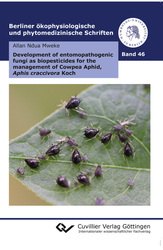| Areas | |
|---|---|
| Serie de libros (96) |
1381
|
| Nachhaltigkeit |
3
|
| Gesundheitswesen |
1
|
| Letra |
2370
|
| Ciencias Naturales |
5408
|
| Matemática | 229 |
| Informática | 319 |
| Física | 980 |
| Química | 1364 |
| Geociencias | 131 |
| Medicina humana | 243 |
| Estomatología | 10 |
| Veterinaria | 108 |
| Farmacia | 147 |
| Biología | 835 |
| Bioquímica, biología molecular, tecnología genética | 121 |
| Biofísica | 25 |
| Nutrición | 45 |
| Agricultura | 1005 |
| Silvicultura | 201 |
| Horticultura | 20 |
| Ecología y conservación de la tierra | 148 |
| Ciencias Ingeniería |
1795
|
| General |
98
|
|
Leitlinien Unfallchirurgie
5. Auflage bestellen |
|
Erweiterte Suche
Development of entomopathogenic fungi as biopesticides for the management of Cowpea Aphid, Aphis craccivora Koch (Volumen 46) (Tienda española)
Allan Ndua Mweke (Autor)Previo
Lectura de prueba, PDF (730 KB)
Indice, PDF (670 KB)
Cowpea aphid (Aphis craccivora Koch) is a major pest of cowpea, an important African Indigenous Vegetable (AIV) in tropical Africa. Cowpea leaves are a popular delicacy providing daily balanced dietary requirements for millions of people. Synthetic chemicals are first choice management strategy for this pest despite their associated risks of food safety, environmental pollution, and development of resistance by the pest. Consumers are increasingly demanding less use of pesticides and this had led to search of alternative pest management products. This study has identified an environmentally and user entomopathogenic fungi based biopesticide that can be used in the management of A. craccovora in vegetables. The efficacy of cowpea aphid control has been enhanced through incorporation of the biopesticide into a cowpea-maize intercropping system. Use of this biopesticide makes economic sense and can confer yield benefit to farmers.
| ISBN-13 (Impresion) | 9783736999084 |
| ISBN-13 (E-Book) | 9783736989085 |
| Formato | A5 |
| Idioma | Inglés |
| Numero de paginas | 132 |
| Laminacion de la cubierta | Brillante |
| Edicion | 1. |
| Serie | Berliner ökophysiologische und phytomedizinische Schriften |
| Volumen | 46 |
| Lugar de publicacion | Göttingen |
| Lugar de la disertacion | Berlin, Humboldt-Universität |
| Fecha de publicacion | 28.11.2018 |
| Clasificacion simple | Tesis doctoral |
| Area |
Agricultura
|
| Palabras claves | Cowpea aphid; African Indigenous Vegetable; Synthetic chemicals |








